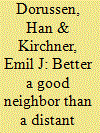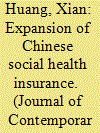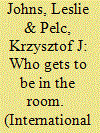| Srl | Item |
| 1 |
ID:
131389


|
|
|
|
|
| Publication |
2014.
|
| Summary/Abstract |
Under what conditions do regional security organizations (RSOs) take up a broader agenda or scope in security governance? Further, does broader scope matter for regional security? These questions are addressed using a quantitative comparative analysis of 25 RSOs over the period 1990-2009. Similarity among members in their capacities and political systems are identified as two central conditions for increased scope. In contrast, hegemony is not a significant factor. Institutionalization also seems to matter: RSOs that have been around longer and encompass more members are more successful in expanding their security agenda. There is only weak empirical support for the idea that RSOs with a broader scope have a stronger pacifying effect on regional security. The implications of these findings are discussed in greater detail for Asian RSOs, which have only limited scope and operate in comparatively high levels of insecurity. However, except from the legacy of conflict, variables identified in the general models apply similarly to Asia.
|
|
|
|
|
|
|
|
|
|
|
|
|
|
|
|
| 2 |
ID:
133816


|
|
|
|
|
| Publication |
2014.
|
| Summary/Abstract |
This article asks 'who gets what, when and how' from China's recent social welfare expansion. Little research to date examines the overall landscape of China's social health insurance, which has changed dramatically since 2003, and the distributive consequences and implications thereof. Drawing on public survey data and fieldwork for empirical support, this article finds that China's recent social health insurance expansion does significantly expand people's access to social health insurance. However, the expansion, which entails health insurance fragmentation and increasing benefit disparities, not only reinforces existing social cleavages such as the rural-urban divide, but it also generates new divisions within urbanites and workforce. Moreover, multiple social cleavages that cross-cut class differences have been institutionalized into China's social health insurance system. This reflects authoritarian regimes' 'divide and rule' tactic in social welfare provision.
|
|
|
|
|
|
|
|
|
|
|
|
|
|
|
|
| 3 |
ID:
133277


|
|
|
|
|
| Publication |
2014.
|
| Summary/Abstract |
Third parties complicate World Trade Organization (WTO) dispute settlement by adding voices and issues to a dispute. However, complainants can limit third parties by filing cases under Article XXIII of the General Agreement on Tariffs and Trade (GATT), rather than Article XXII. We argue that third parties create "insurance" by lowering the benefit of winning and the cost of losing a dispute. We construct a formal model in which third parties make settlement less likely. The weaker the complainant's case, the more likely the complainant is to promote third party participation and to settle. Article XXII cases are therefore more likely to settle, controlling for the realized number of third parties, and a complainant who files under Article XXIII is more likely to win a ruling and less likely to see that ruling appealed by the defendant. We provide empirical support using WTO disputes from 1995 to 2011.
|
|
|
|
|
|
|
|
|
|
|
|
|
|
|
|